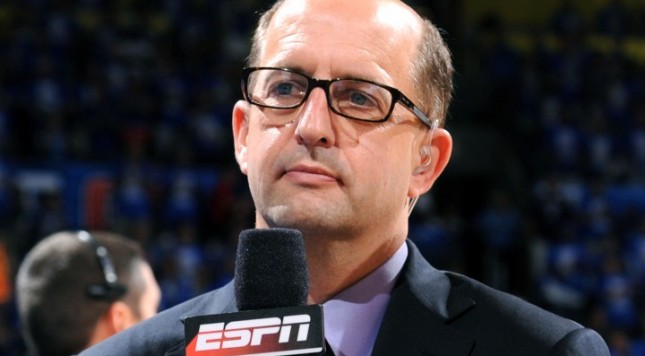Our team at Crossover Chronicles is covering various aspects of the Western Conference finals. John Cannon offered a Golden State perspective on Game 4, and other members of our staff have written about the West finals from the Houston Rockets’ point of view. Want to read more about these two teams? We’re on it.
Yet, for all the team-specific stories that have emerged from Warriors-Rockets, some issues larger than the chase for the NBA title have become a constant feature of the playoffs, especially over the past 72 hours. One game after another, a controversial ruling on a flagrant (or non-flagrant) foul makes news, raising questions about the way in which the NBA reviews these plays.
Monday night, during ESPN’s broadcast of Game 4 of the West finals, analyst Jeff Van Gundy stepped into the fire. He got into a contentious but informative discussion with consultant-analyst (and former NBA official) Steve Javie and said that one person should review all flagrant-foul calls. Whereas Javie said that this was a subjective matter, Van Gundy argued that if these decisions were funneled through one person, every stakeholder in the league — chiefly teams, coaches and players — would receive the consistency these situations demand and deserve.
Maybe you’re of the opinion that Al Horford should not have been ejected for his elbow and body-lean on Matthew Dellavedova on Sunday night in Game 3 of the Eastern Conference finals between the Atlanta Hawks and Cleveland Cavaliers. Maybe you think Dwight Howard should have been ejected for his elbow to Andrew Bogut’s face in Game 4 of Rockets-Warriors. No matter where you stand on specific plays, the whole NBA community of fans, coaches and players can agree that one night’s ruling is different from another, even when the details of plays are appreciably similar — similar enough to recommend equal punishments.
Recall the fact that J.R. Smith — for delivering a blow less forceful than Howard’s, in Game 4 of the Cavs-Celtics first-round series — was suspended for two games. If Howard is not suspended for Game 5 of Rockets-Warriors, we will have three situations in which three relatively equal actions were all punished differently — one with a two-game suspension, one with an ejection, one with a non-ejection and non-suspension. You could argue on the margins about slight differences among those three incidents, but they all involved relatively forceful blows at or above the shoulders. That the NBA’s review and punishment procedures could arrive at wildly different conclusions in those three incidents shows how inconsistent the league’s process really is.
This is where we go back to Jeff Van Gundy’s essential point: While interpretation of calls undeniably possesses a subjective dimension on a granular level, filtering calls through one person whose only job is to make rulings on flagrant-foul calls (or non-calls) will create a seamless, consistent environment in which coaches and players will know what to expect. This won’t eliminate subjective dimensions from interpreting these calls, but it would certainly move the ball forward in terms of reducing subjectivity and increasing objectivity. Modifying the rules and procedures surrounding flagrant-foul situations is desperately needed, as is the case for other rule questions in the league (such as clear-path fouls).
Here’s the other main reason why JVG’s view points the way to healthy and needed reform in the NBA: As is the case in other sports, shifting replay reviews from on-court/on-field arbiters to a central command center — which is what the NHL and MLB do, but which the NFL has not yet done — will remove the on-court officials from feeling they need to make a call to avoid drawing the ire of the athletes and coaches who are breathing fire down their necks during a game.
Having a person in a remote location (with access to a full assortment of camera angles) provides an emotionally detached source for each and every ruling. This is healthy, and it also helps the on-court officials by taking this decision out of their hands. If a team has a grievance, it can take it up with the one-person flagrant-foul expert, presumably in Seacaucus, New Jersey… after the game is over. Officials don’t have to bear the brunt of a decision they might make.
We saw in Game 4 how much of a hothead Joey Crawford can be. He brings a different mindset and opinion to the court — relative to the officials in Game 3 of Hawks-Cavs, and relative to all other officials. Human beings are unique individuals, which is a fundamental reason for the variance between and among the calls and subsequent punishments we’ve seen in flagrant-foul incidents during the playoffs.
Routing these specific calls through one man might give that one man too much power. However, if rules and procedures are beefed up and clarified enough, to the point where one man merely implements a policy more than injects his interpretations into said policy, this approach would work.
No matter where you came down on the Horford-Delly or Howard-Bogut rulings, you should be able to agree that Jeff Van Gundy is right, and Steve Javie is in need of enlightenment, on flagrant-foul issues. Filter these decisions through one man at an off-site location. Clarify the procedures and put more specificity into the rules themselves.
We’d get a better process — and likely much better results — than we have now.

